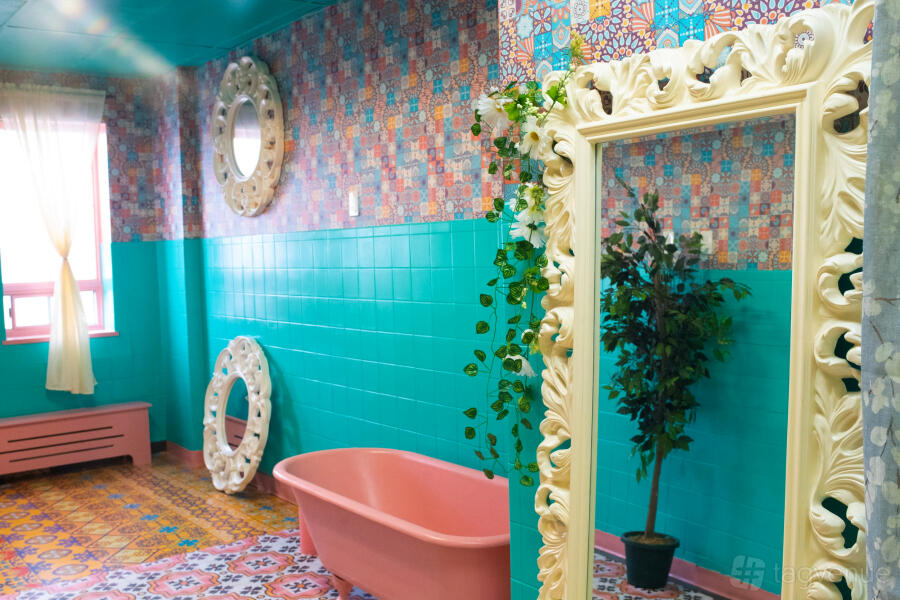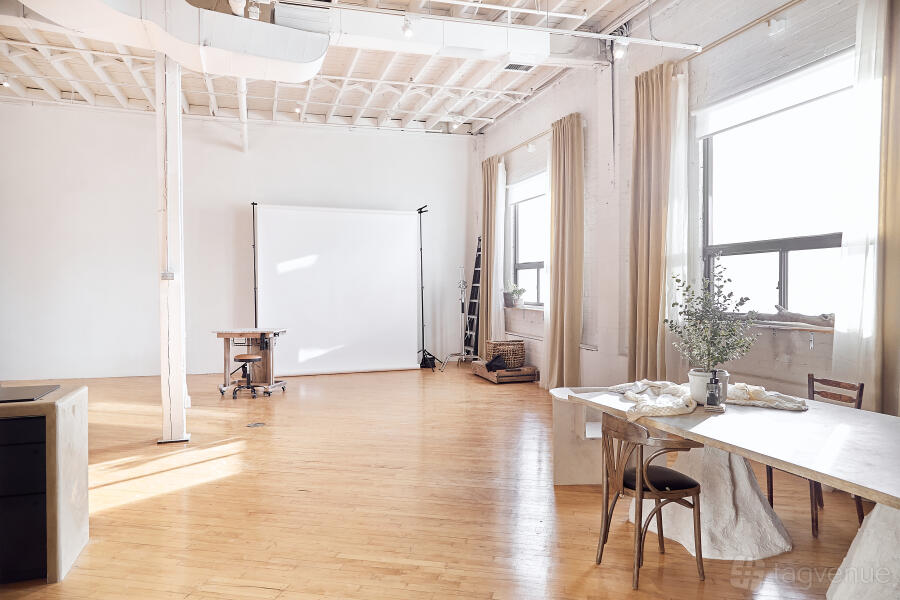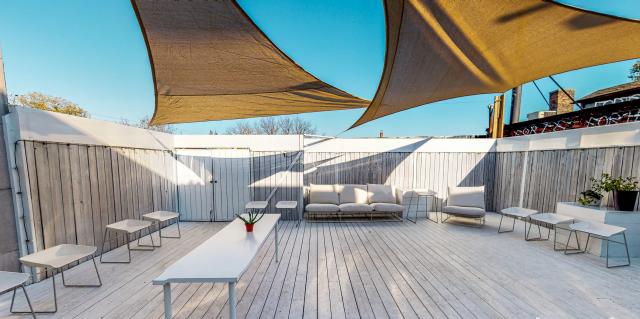Top Filming Locations in Toronto, ON
Whether you’re shooting a short film, a commercial, a music video, or a full big-screen production, Toronto has all the top filming locations you are looking for. Historical buildings, vibrant streets, or even a mix of the two - you won’t be lacking choice when looking for a film location here. Known as one of the “Hollywood North” cities, Toronto has already satisfied even the pickiest filmmakers. Join such blockbusters as X-Men, The Incredible Hulk, or Suicide Squad, which all have been filmed in Toronto, and search for your next filming location now.
-
Node Studio
40 guestsBright & Airy Natural Light StudioDufferin Grove, Toronto, ONIts Scandinavian furniture adds a touch of elegance, making it great for staging, filming, and portrait photography. The versatile space is also well-suited for client meetings or small team workshops.from C$55
hire fee / per hour -
Entire Studio
30 guestsViva StudiosStonegate-Queensway, Toronto, ONOur Film Studio offers different spaces to make your production neat. Starting from the shooting area, we offer 2,000 sqft of space. So no need to worry about large setups.from C$150
hire fee / per hour -
Entire Venue
60 guestsMaison Film StudiosOakwood-Vaughan, Toronto, ONOur creative spaces can welcome up to 60 people with multiple themed sets, vintage decor, and full production amenities. Ideal for photoshoots and filming and small types of events.from C$150
hire fee / per hour -
Blue Room
30 guestsMaison Film StudiosOakwood-Vaughan, Toronto, ONBlue Room can welcome up to 30 people with blue-themed sets, vintage decor, and full production amenities. It is ideal for photoshoots, filming and small types of events.from C$100
hire fee / per hour -
Studio
250 guestsVersatile Photography & Film StudioDorset Park, Toronto, ONWhether you're shooting a commercial, a fashion spread, or an indie film, our studio provides the perfect backdrop.from C$150
hire fee / per hour -
Loft Studio
150 guestsBank StudiosLeslieville, Toronto, ONThe kitchen features a sink, fridge, and a private washroom. Additionally, there is a separate filming room that can be used as a breakout room, a large glam room with four chairs for hair and makeup artists, a private washroom,from C$166
hire fee / per hour -
Office Rental
10 guestsDiptych StudioEntertainment District, Toronto, ONAAndy
“Great space with lots of options and backdrops. Nice bright windows that can also be covered with shades.”from C$30
hire fee / per hour -
Bright Liberty Village Loft
80 guestsSorry StudioLiberty Village, Toronto, ON#Supervenue
SStephanie
“Great space - will be used by our team again soon!”from C$95
hire fee / per hour -
West End Creative Studio
30 guestsStudio 162Weston-Pellam Park, Toronto, ONcreative studio in Toronto, designed for filmmakers, photographers, and event organizers. This fully-equipped space features seven colorful backdrops, including a green screen, abundant natural light, and dedicated hair andfrom C$75
hire fee / per hour -
Retro Studio w/ Grand Piano
20 guestsVintage Paradise Studio with Grand PianoJunction Area, Toronto, ONSee why we are the top choice for Photography, Music Videos, Short Films, Dancing, Commercials and more, we've seen it all! RGB 70W Video Light X2from C$88
hire fee / per hour -
Cyclorama Studio
30 guestsBC StudioYork University Heights, Toronto, ONKKh
“The venue was well equipped with everything we needed”from C$180
hire fee / per hour -
Entire Venue
20 guestsAdonis Workroom StudiosSouth Riverdale, Toronto, ONYYds
“Awesome space, awesome host.”from C$110
hire fee / per hour
- 1
- 2
- 3
- ...
- 7
Budget
Event Type
Area type
Venue type
Accessibility features

FAQs about Top Filming Locations in Toronto, ON
For a big city vibe, check out the intersection of Yonge Street and Dundas East Street. This public square is spacious and filled with energy. With its futuristic look, the Toronto City Hall boasts striking urban architecture for amazing open-air shoots. With its rows of comfortable rows of homes and stores, Danforth Avenue, known locally as ‘The Danforth’ offers a perfect city neighborhood look. The Distillery District is another great city location and offers an urban atmosphere that can mimic anywhere from New York to LA. Local restaurants and cafes are also popular choices as are stately residences such as La Belle Mansion or Casa Loma.
When hiring a large location, you can expect to pay between $1000 to $10000 per day; prep and wrap days will be counted as half days and should be factored into the total cost. The size of the space will determine the final cost. For smaller areas, such as stores, terraces, or cafes, prices will range between $100 to $500 per hour. (All data from Tagvenue.)
You will need to apply for a permit if you are planning on shooting with a large crew. Unlike other locations, Toronto does not charge for the film permit, but you will be expected to cover the cost of insurance and other additional services such as parking, garbage removal, etc. If you are filming on private property you must request approval before applying for the permit. If you have a small crew of only 2 or 3, you will not need a permit. However, it is best to notify management if you are shooting in buildings or other locations.
As Canada’s largest city, Toronto offers all types of spaces you can use for your film location. You can browse through various professional studios in the city, prepared to take in a filming crew, or look for spaces that have been used as a filming location before. Depending on your needs, you can look for cozy lofts, artistic and modern galleries, or multi-purpose spaces. Many of the cafes, restaurants and other venues will also gladly become your filming spot.
Your Guide to Renting Filming Locations in Toronto, ON
You may be a longtimer in the film industry or a beginner trying to make your grand debut, but scouting for a perfect film location can still pose a few challenges. Whether you’re looking for a studio or an exterior location, we’ve prepared a list of ten questions that will help you focus your search!
Ten things to ask when choosing a film location in Toronto
- Is the location really that important?
Securing the right location for your film is one of the most important elements of the pre-production process. The right location can support the story you’re portraying in the film and it can give more meaning to what you’re trying to convey. Before scouting a location, prepare the script, and a story or shot board. These will help you know exactly what you are looking for and what kind of location will support your vision.
- How do I make sure the location won’t exceed my budget?
Set your budget early in the process and it won’t have to cost a bundle. If you don’t set your budget upfront you may come across a location that will suit you perfectly but may exceed your budget. In this case, you will face a very difficult decision and unless you are prepared to tackle it, make sure you don’t need to deal with it in the first place.
- How do I start scouting for a film location?
Once you know what you want, start your research. You can quickly eliminate some locations by looking online first. Scout for places that have been used for a film before, read forums, even check which spots are popular among local influencers. By looking for places where residents or tourists frequently go, you may find gems you would have otherwise never known about. An online search will also save you time and money you would have spent by visiting every location yourself.
4. Should I visit the location myself?
Yes! Once you have a list of places, you can go and see them in person. Even the best photos won’t be able to reflect the advantages or disadvantages of the entire location or reveal its ambiance. Go there, feel the space, and see it with your own eyes.
5. What if I don’t like any of the locations I’ve found?
Perhaps the location you’ve found wasn’t what you were looking for. Or maybe you like the atmosphere of the neighbourhood, but not the exact spot. Don’t worry! Walk around, turn the other street, search the area. What you are looking for may be just around the corner.
6. How do I prepare for a visit to a film location?
Take the camera and a notebook with you. Look at the location through the lens. The place may look better than what you notice at the first glance, or quite the opposite - what you will see on the screen will make you resign on the spot. But once you’re there, take some photos or videos and write down your thoughts for future reference.
7. What should I look for once I’m at my potential filming location?
Make sure you will be able to shoot all the shots you want at the location. At the end of the busy day of filming, you wouldn't want to find out that the final scene, which is to be shot on a balcony, has nowhere to be shot - because there’s no balcony! Bring your script or the shot board with you, know exactly what you need, and you will be able to avoid such a situation.
8. Will the filming location accommodate all of my technical needs?
Even the best location may turn out to be a fiasco if you are unable to set up all the equipment you need. Check if there are enough electrical power sources and if you can fit all the gear and the crew there. Also ensure you are able to transport everything and everyone safely. You are an artist trying to convey your vision, but you are also responsible for the people and the equipment you are working with.
9. When should I go to the location?
Go to the location at the same time of day as you will be filming. Check what the light looks like. Make sure there is no delivery to the nearby store or any other occurrence that will delay your filming. Listen to the sounds around you as well. You can easily ask for rescheduling a delivery but if there’s an airport nearby you won't be able to do much about the planes flying over your head.
10. I found the spot! Can I start filming now?
Great! But you can’t jump into filming just yet. Make sure you are allowed to film in the location. If it’s private property, ask the owners. But if you are filming in a public space, you may need to contact the local government office or film commission for assistance. If your filming may disturb the traffic or will be done late at night in a residential area you may need extra permissions, so double check you have all the permits you need.















